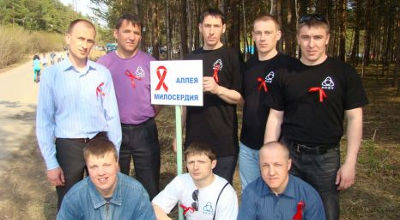OM Russia Missionaries Serve as Good Samaritans in HIV Ministry
You stand in the queue looking at the people in front of you and behind you, wondering about their lives, what their stories are, why they are also awaiting results of an HIV test, and whether or not they are infected. Then your turn comes.
You enter the small office and sit down at the desk. The doctor looks up from his notes and says, “I’m afraid I’ve got some bad news.” You don’t hear another word. Your head is swimming. This is what you suspected—dreaded—but somehow it just can’t be happening to you. There must be a mistake. Maybe the test results have been mixed up?
Your life is turned upside-down and nothing is certain anymore. The doctor has finished talking, walks around the desk and opens the door for you. You leave the clinic, but the world you now enter is totally different from the one you came from just 10 minutes ago—it is now full of fear, doubt, ignorance and shame. Where do you go now? What do you do?
Due to Russia’s crisis with the HIV virus, this scenario is played out over 200 times every day in the country. One of OM Russia’s goals is to be a “Good Samaritan” in such cases—following Jesus’ commandment to love our neighbors who have fallen into the hands of robbers, including into the hands of the HIV virus, which robs its victims of so much.
“We have a good relationship with the state AIDS centre in Novosibirsk,” said Jenya Losev, who coordinates OM Russia’s response to the HIV crisis in Russia. “When someone is diagnosed as being HIV positive, they refer them to us.”
The response team is made up of volunteers who meet every two weeks. Last week the group leader, Igor, received a phone call during a meeting from a woman who had just been diagnosed with HIV. The clinic had given his number to her, and she called him in desperation after receiving the shattering news. She told Igor she planned to commit suicide in the next 15 minutes.
Igor made her promise not to do anything until he finished his meeting and could speak with her. Although he continued the meeting with his clients, he couldn’t concentrate until he was able to ring her. Fortunately, she had kept her word. She shared her fears and her conclusion that her life had already ended. Igor calmed her down and invited her to the HIV self-help group, which would provide some answers for her multitude of questions.
Every week the group receives four or five such calls for consultations. The group’s vision is to “offer a measure of temporal hope and practical support, but also to share where the Christian group members have found their source of eternal hope.”














































